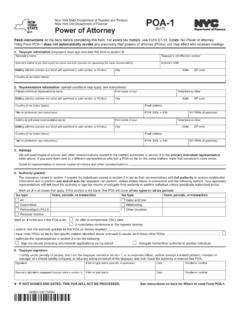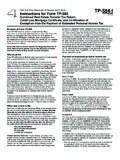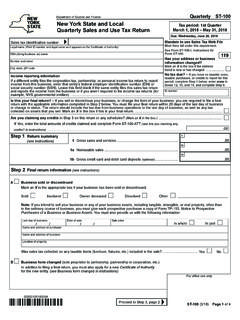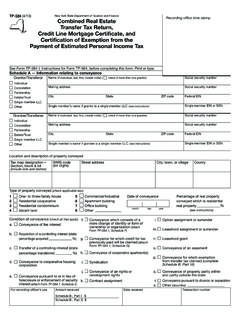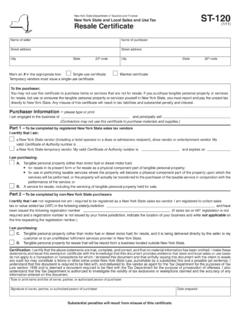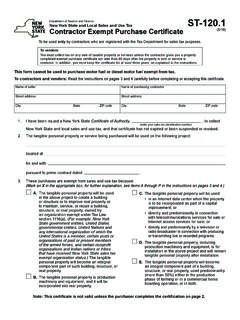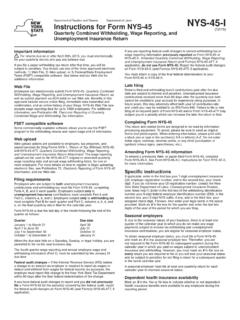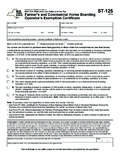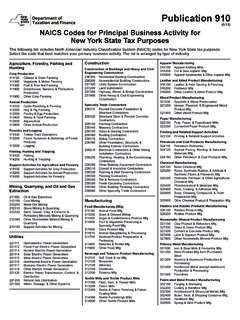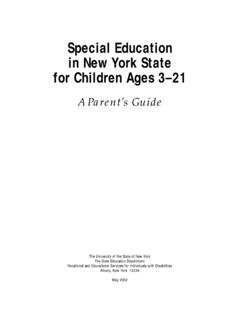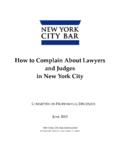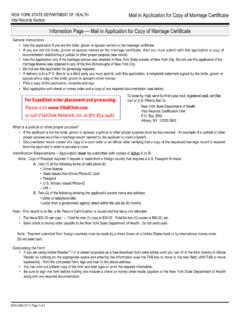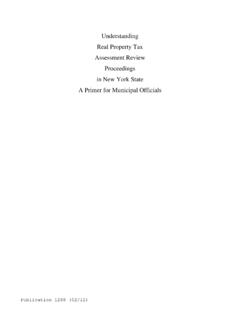Transcription of Contesting Your Assessment in New York State
1 1 Contesting your Assessment in new york State (Previously titled What to do if you disagree with your Assessment ) 1 Grievance 2 Completing grievance Form 5 OVERVIEW If you own property in new york State , you are eligible for formal review of your Assessment . There are two levels of formal review: 1) Administrative review - the grievance process is conducted at the municipal level 2) judicial review in order to pursue judicial review you must first go through administrative review includes two options: 1. Small Claims Assessment Review (SCAR) - a low-cost option available to most homeowners information is available from the website of the Unified Court System - 2.
2 Tax certiorari proceedings in State Supreme Court - to pursue this option, you should contact an attorney. Before pursuing formal review of your Assessment , you should first determine if you are assessed fairly: Step One: What is the assessor's estimate of the market value of your property? You ll find this information on the Assessment roll. You should check your Assessment annually prior to Grievance Day (typically the fourth Tuesday in May, but confirm the date with your assessor). If your municipality is assessing at 100% of market value, your Assessment and the assessor s estimate of market value will be identical.
3 Publication 1114 (02/12) 2 If assessments are not at 100% of market value, you can use this formula to calculate the assessor s estimate of market value: Assessment level of Assessment = assessor s estimate of market value Step Two: Develop an estimate of the market value of your property Homeowners may refer to our publication How to estimate the market value of your home Other property owners may wish to contact an appraiser or other real estate professional Generally, if the assessor s estimate of the market value of your property reflects roughly the amount for which you could sell your property, then your Assessment is fair.
4 Step Three: If your Assessment is too high Often, an informal discussion between a taxpayer and an assessor can result in a sharing of information beneficial to both parties. If such a discussion does not result in a reduction in your Assessment , and you still feel as though your Assessment is too high, you may wish to contest your Assessment . Rather than determining that your Assessment is too high, you might find that your property is assessed based on its market value, but the rest of the community is assessed at a lower level of Assessment . Again, you should discuss this with your assessor.
5 For example, your property is worth $100,000 and your Assessment is $100,000. However, properties in your town are assessed at 90% of market value. your property is overassessed your Assessment should be $90,000. If you are assessed fairly, but you feel that your taxes are too high Assessors do not determine your property taxes. If you feel as though your Assessment accurately reflects the market value of your property, but you still feel that your property taxes are too high, you may wish to address this matter with the taxing jurisdictions that impose taxes in your community - school board, county legislature, city council, town board, fire district and other special districts.
6 The assessor cannot assist you with tax matters, but only with matters pertaining to the assessed value of your property. GRIEVANCE PROCEDURES Any person who pays property taxes can grieve an Assessment , including: property owners purchasers tenants who are required to pay property taxes pursuant to a lease or written agreement Only the Assessment on the current tentative Assessment roll can be grieved - you can t grieve assessments from prior years. There is no cost to grieve an Assessment and it does not require you to hire a lawyer. 3 Filing the grievance form Outside of new york City and Nassau County, use Form RP-524 Complaint on Real Property Assessment to grieve your Assessment .
7 The form is available from our website ( ) or from your assessor s office. new york City residents - Contact the new york City Tax Commission - 212-669-4410 Nassau County residents - Contact the Nassau County Assessment Review Commission the grievance form with the assessor or the board of Assessment review (BAR) in your city or town. If your property is located in a village that assesses property, you will have two assessments, one for the village and one for the town. To grieve both assessments, you are required to file a separate Form RP-524 with both the town and village.
8 Grievance dates for villages will vary from towns (see below) contact your village clerk to determine if your village assesses property and for grievance dates (see below. Check with your assessor to confirm Grievance Day in your community Grievance Day is the deadline for submitting Form RP-524 and the day that the BAR meets to hear complaints. In most communities, Grievance Day is the fourth Tuesday in May. However, there are exceptions: Cities and towns that share an assessor can adopt different Grievance Days between thefourth Tuesday in May and the second Tuesday in June new york City - the Assessment Review Commission meets throughout the year, but complaintsmust be filed by March 15 for Class One properties and March 1 for all other properties Nassau County the Assessment Review Commission meets throughout the year, butcomplaints must be filed by March 1 Other cities dates vary.)
9 Contact your assessor or city clerk for the date Suffolk County - town BAR s meet on the third Tuesday in May Westchester County - town BARs meet on the third Tuesday in June Villages that assess property typically, the BAR meets on the third Tuesday of February;however, dates can vary check with your village assessor or village clerkNon-resident property owners If you re a property owner who doesn t reside in the municipality where you own property, you have additional rights related to grieving your Assessment : Deadline for filing Form RP-524 In most communities, the deadline for submitting Form RP-524 is Grievance Day (see below).
10 If you mail the form, it must be received by the assessor or BAR no later than Grievance Day. If you do not file the form by the deadline, you will lose the opportunity for administrative and judicial review of your Assessment this year. Local government contact information is available from our Municipal Profiles Web page. 4 You can file a written request for a list of your property, the assessed value, and the time and place for hearing grievances. The request must be made no later than 15 days prior to Tentative Roll Date. (Tentative Roll Date is May 1 in most communities, but confirm the date with your assessor also see our property tax calendar Web page).
